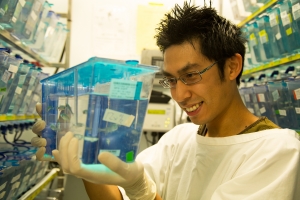Crossing the zebrafish genes
Research news
They are only a few centimetres long, they are transparent and their natural habitat is warm tropical streams.
The humble zebrafish would seem to have nothing in common with humans, yet, in fact, they share 70 per cent of our genetic code and are providing tremendous insights within genetic research around the world.
The zebrafish has been ideal for Alfred Deakin Research Fellow Clifford Liongue who is examining the genetic underpinnings of the blood cancer lymphoma, with the aim of improving treatment, and perhaps getting closer to a cure.
Dr Liongue explains that zebrafish are particularly popular with scientists because, apart from sharing so much of our genetic code, the transparent embryos develop externally, allowing easy monitoring of development. They grow from a single cell to larva in about seven days, and they hatch a few hundred eggs in a single spawning.
“They also make life easy in the lab,” he explains. “As well as being genetically malleable, they don’t smell and they are very light.”
Based in Deakin’s School of Medicine at Waurn Ponds, Dr Liongue is researching the gene BCL6A and its interaction with the gene STAT5. During blood development, and in general immune function, both genes tightly regulate each other. Misregulation upsets the balance between the two genes, leading to human lymphoma – a cancer that begins in immune system cells and spreads throughout the body in lymph fluid.
Lymphoma is the most common form of blood cancer in Australia and the sixth most common form of cancer overall. It has two main types, Hodgkin and non-Hodgkin.
The use of zebrafish for medical research has grown significantly in recent years, particularly since the “human genome” project unlocked the structures of all our 20,000 genes. Now, zebrafish are helping scientists to unravel the function of the genes, determining what they do and how they interact, and leading to research insights in areas such as obesity, diabetes, skin cancer, muscular dystrophy, leukemia and foetal development.
Dr Liongue has always had a passion for science, especially problem solving and “being on the edge of science.” He is very optimistic about his research, with preliminary data “looking promising.”
“We will gain an understanding of the underlying molecular mechanisms of these two genes,” he says. “It is the first step towards developing drugs that can target the specific molecules involved in lymphoma, and - thanks to the zebrafish - one day we might be able to find a cure.”
Share this story
 Dr Clifford Liongue
Dr Clifford Liongue
